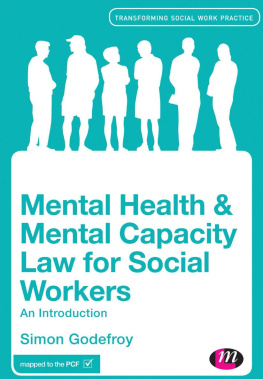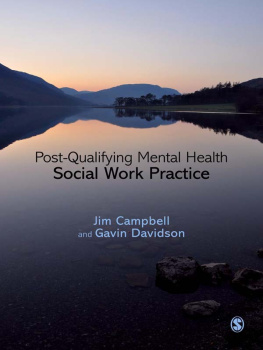Understanding Social Work
Practice in Mental Health
Understanding Social Work
Practice in Mental Health
Vicki Coppock and Bob Dunn
Vicki Coppock and Bob Dunn 2010
First published 2010
Apart from any fair dealing for the purposes of research or private study, or criticism or review, as permitted under the Copyright, Designs and Patents Act 1988, this publication may be reproduced, stored or transmitted in any form, or by any means, only with the prior permission in writing of the publishers, or in the case of reprographic reproduction, in accordance with the terms of licences issued by the Copyright Licensing Agency. Enquiries concerning reproduction outside those terms should be sent to the publishers.
SAGE Publications Ltd
1 Olivers Yard
55 City Road
London EC1Y 1SP
SAGE Publications Inc.
2455 Teller Road
Thousand Oaks, California 91320
SAGE Publications India Pvt Ltd
B 1/I 1 Mohan Cooperative Industrial Area
Mathura Road
New Delhi 110 044
SAGE Publications Asia-Pacific Pte Ltd
33 Pekin Street #02-01
Far East Square
Singapore 048763
Library of Congress Control Number: 2009924028
British Library Cataloguing in Publication data
A catalogue record for this book is available from
the British Library
ISBN 978-1-4129-3504-3
ISBN 978-1-4129-3505-0 (pbk)
Typeset by C&M Digitals (P) Ltd, Chennai, India
Printed and bound in Great Britain by Biddles Ltd, Kings Lynn
Printed on paper from sustainable resources
CONTENTS
ABOUT THE AUTHORS
Vicki Coppock is Reader in Social Work and Mental Health in the Department of Social and Psychological Sciences at Edge Hill University, Lancashire. She is also a qualified and experienced mental health social worker. She has a research and publications record in the critical analysis of theory, policy, legislation and professional practice in the field of mental health. Vicki is co-author of Critical Perspectives on Mental Health (Routledge, 2000) with John Hopton and had overall editorial responsibility for Understanding Social Work Practice in Mental Health.
Bob Dunn is Senior Lecturer also in the Department of Social and Psychological Sciences at Edge Hill University where he has taught for the last ten years. His teaching covers social work, childhood studies and youth justice. Some of Bobs previous responsibilities include working as a local authority Staff Development and Training Officer and running a unit for disturbed adolescents at the Cotswold Community. He has also researched deaths in prison, police and psychiatric custody.
INTRODUCTION
In the first decade of the twenty-first century mental health practitioners have witnessed unprecedented changes in mental health law and policy that have had profound consequences for their professional practice. In this book we explore the historical, theoretical and political contexts underpinning these changes and their impact on mental health practitioners and on users of mental health services and their carers. Many of the changes that have taken place (and are still taking place) relate to the emergence of new professional roles, skills and systems of service delivery that are no longer so clearly tied to traditional disciplinary lines. The traditional boundaries around who does what in mental health care are being renegotiated and users of mental health services and their carers are increasingly influential in shaping the modern mental health system.
In this context it might then appear strange that this book should address itself to understanding social work practice in mental health. However, the focus on social work is deliberate and our defence of this rests in our belief in the central importance and distinctive contribution that social work makes in advancing a social model of mental health theory and practice that is highly valued by users of mental health services and their carers. Unlike many other mental health professions, social work has not always been very good at articulating precisely what it is that it brings to the field of mental health. In recent years this has started to change and, as we will discuss in this book, perhaps out of the necessity to ensure its survival, social work is reasserting its identity.
Understanding Social Work Practice in Mental Health will enable students of social work develop core knowledge, understanding, skills and values for professional social work practice in the mental health context. However, it is not an instruction manual on how to do mental health social work. Rather, we firmly believe that it is only through a critical social scientific interrogation of the modern mental health system that students can learn to develop as critically reflective practitioners. Social workers are currently the only mental health practitioners with social science training. Whereas traditionally the emphasis in mental health education and training is on medical diagnosis, treatments and medication and mental health law, social work students are concerned with:
- developing an understanding of mental health theory, law, policy and practice as contested arenas
- developing a critical awareness of various theoretical and ideological perspectives that have contributed to knowledge about mental health and mental distress in multi-professional contexts
- developing an understanding of the complex moral and ethical dimensions underpinning mental health theory, law, policy and practice
- developing an understanding of, and way of working with, the personal and social consequences of inequality, discrimination, stigma and abuse
- learning to tolerate uncertainty and complexity in practice.
This book is deliberately designed to encourage students to critically examine the world of mental health theory, law, policy and practice from a variety of perspectives those of users of mental health services, their carers and mental health professionals. To achieve this we use case studies, exercises and questions to stimulate debate and engage readers in critical reflection on key contemporary issues in mental health practice. Explicit links are made to academic and professional standards, codes of practice and frameworks for social work and mental health. Saying this, the book is not exclusively directed at students of mental health social work. The range of issues explored here should be of equal interest and relevance to other mental health practitioners particularly given the strong drive in government policy towards interprofessional education, training and practice. Additionally, the book is designed to be of interest to anyone studying mental health and mental distress outside of the professional context.
In we explore the contested nature of mental health and mental distress, introducing the different terminology, concepts and theories used in the field. This will include lay understandings of and attitudes towards mental distress in addition to professional perspectives, as both are significant in contemporary mental health practice. The power of language, images and representations of mental health and mental distress that circulate in society and contribute to the construction of the person in mental distress as other is a key theme. Readers are invited to examine and reflect on their own personal attitudes to mental distress as a basis for understanding the stigma that is associated with receiving a mental health diagnosis. We outline and debate the relative contribution of medical and social models of mental health and illustrate the tensions between them in the context of how a person becomes a user of mental health services. We conclude with a discussion of the importance of developing a holistic, user-centred approach to mental health assessment.








